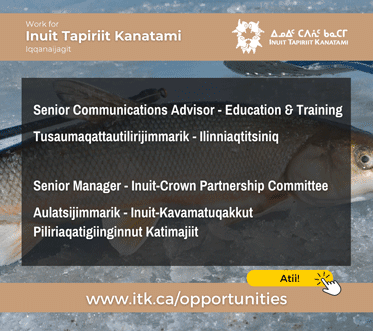“I see a decrease in abuse, because a lot of the guys are smiling.”
Don’t go slow on mining, leaders say
Nunavut leaders at a public forum in Iqaluit last week said they won't even think about the idea of slowing the pace of mining development to give the people of Nunavut more time to prepare.
"No way," said Paul Kaludjak, the president of Nunavut Tunngavik Inc., in response to a written question from an audience member. "We've got to catch up."
Globe and Mail columnist Jeffrey Simpson chaired the forum, held April 18 at Inuksuk High School with a panel made of mining industry executives, bureaucrats and political leaders. The forum was broadcast live over the internet.
Though it was billed as a "town hall meeting," mine company officials and employees of mining-related bureaucracies dominated the mostly English-speaking non-Inuit audience.
The Government of Nunavut estimates that mines will create about 1,500 new jobs for Nunavut residents over the next 10 years, a number equivalent to about 12 per cent of the work force.
Even grassroots exploration creates scores of seasonal jobs for Nunavut residents. In 2006, mineral exploration firms spent $200 million in Nunavut and in 2007, they're expected to spend $225 million.
Ed Picco, the Nunavut education minister, said he doesn't fear the social impact of mining development and that all those new jobs could cure some of Nunavut's current social problems.
"There are more social ills when there is high unemployment. You have more social ills when you are on income support," Picco said.
David Simailak, the finance minister and MLA for Baker Lake, said new jobs created by the Meadowbank gold mine, now entering its construction phase, are already reducing social problems in his community.
"I see a decrease in abuse, because a lot of the guys are smiling. They're very proud of what they are doing. It is a very positive thing that is happening in Baker Lake," Simailak said.
Cumberland Resources Ltd. of Vancouver developed the Meadowbank project, but they've just closed a friendly takeover deal launched by Agnico-Eagle Mines Ltd, who will now build and operate the Meadowbank mine.
This means Agnico-Eagle inherits two big agreements that guarantee jobs and training for Nunavut residents.
One is a development partnership agreement with the Government of Nunavut. Under it, Agnico-Eagle gets a fuel tax rebate from the GN. In exchange, Agnico-Eagle created an on-the-job-training program for 40 Baker Lake residents on construction of a 110-kilometre all-weather road from Baker Lake to the mine site.
Road construction started this past February. Of the 64 jobs on the road project, the company says 43 are held by Inuit.
The other agreement is an Inuit impact and benefit deal with the Kivalliq Inuit Association, signed in March 2006.
Though the precise terms of the IIBA are secret, a nine-page summary says the company must create at least 60 training positions for Inuit. The terms of the IIBA apply as well to all companies that do contract work for Agnico-Eagle on Meadowbank.
Simailak also praised Areva Resources Canada Ltd., a uranium company that's reviving the dormant Kiggavik uranium project about 80 kilometres west of Baker Lake.
"They work with the community," Simailak said in reference to a public information office that Areva opened last year in Baker Lake.
John Layton of the Miramar Mining Corp. said mining creates jobs and training opportunities that aren't necessarily related to digging rock out of the ground.
As an example, he said Miramar is sponsoring a training program in Kugluktuk for hair stylists.
Ed Picco said the Nunavut government has sent 100 residents to Morrisburg, Ont., to train as heavy equipment operators and is finally ready to open a trade school in Rankin Inlet next year.
He said, though, that mines create numerous jobs that aren't necessarily related to construction trades, such as jobs for clerks, receivers, administrators and human resource workers.
"We have to get away from the old analogy of someone in a hole with a pick and shovel. We want skill sets left in the community," Picco said.





(0) Comments